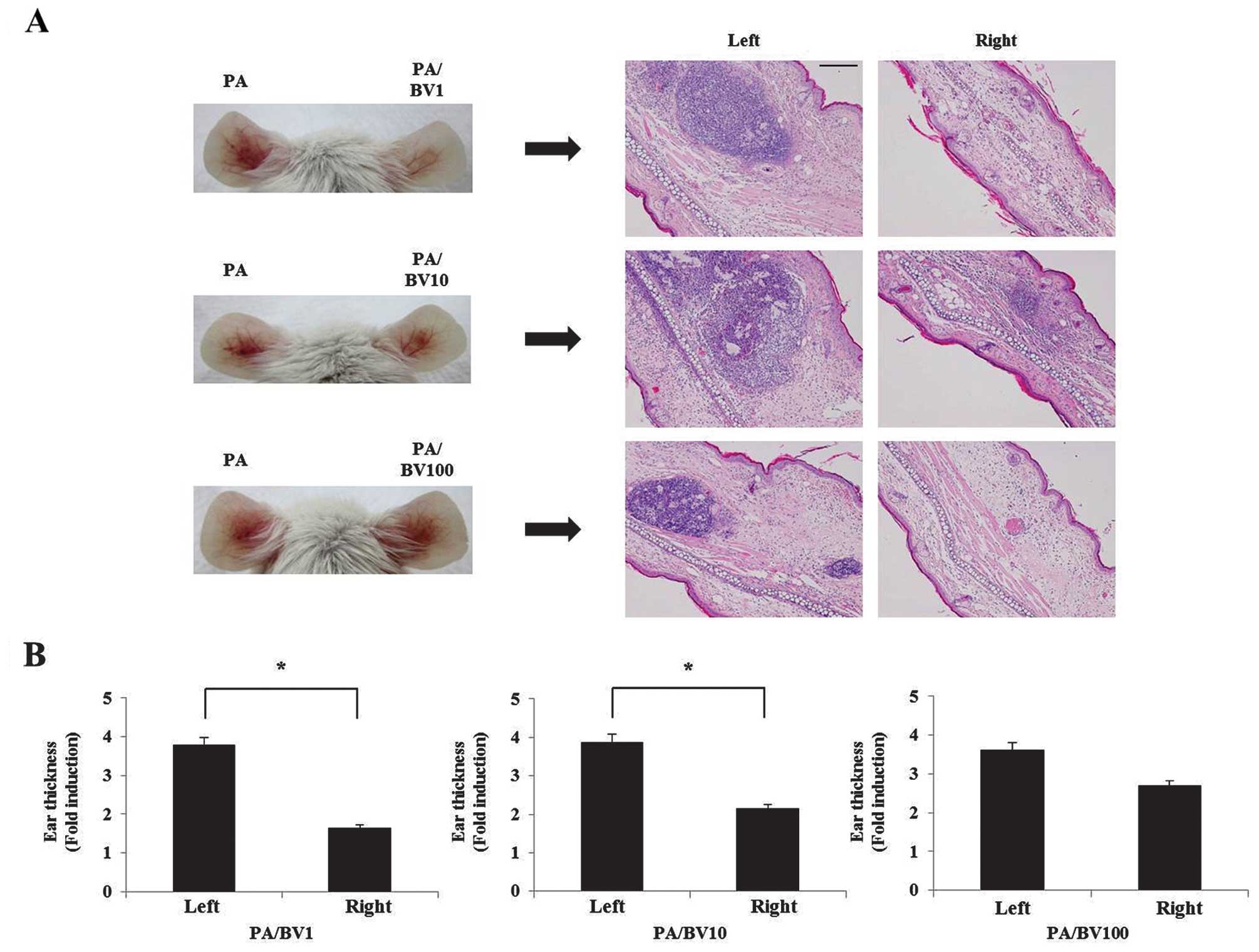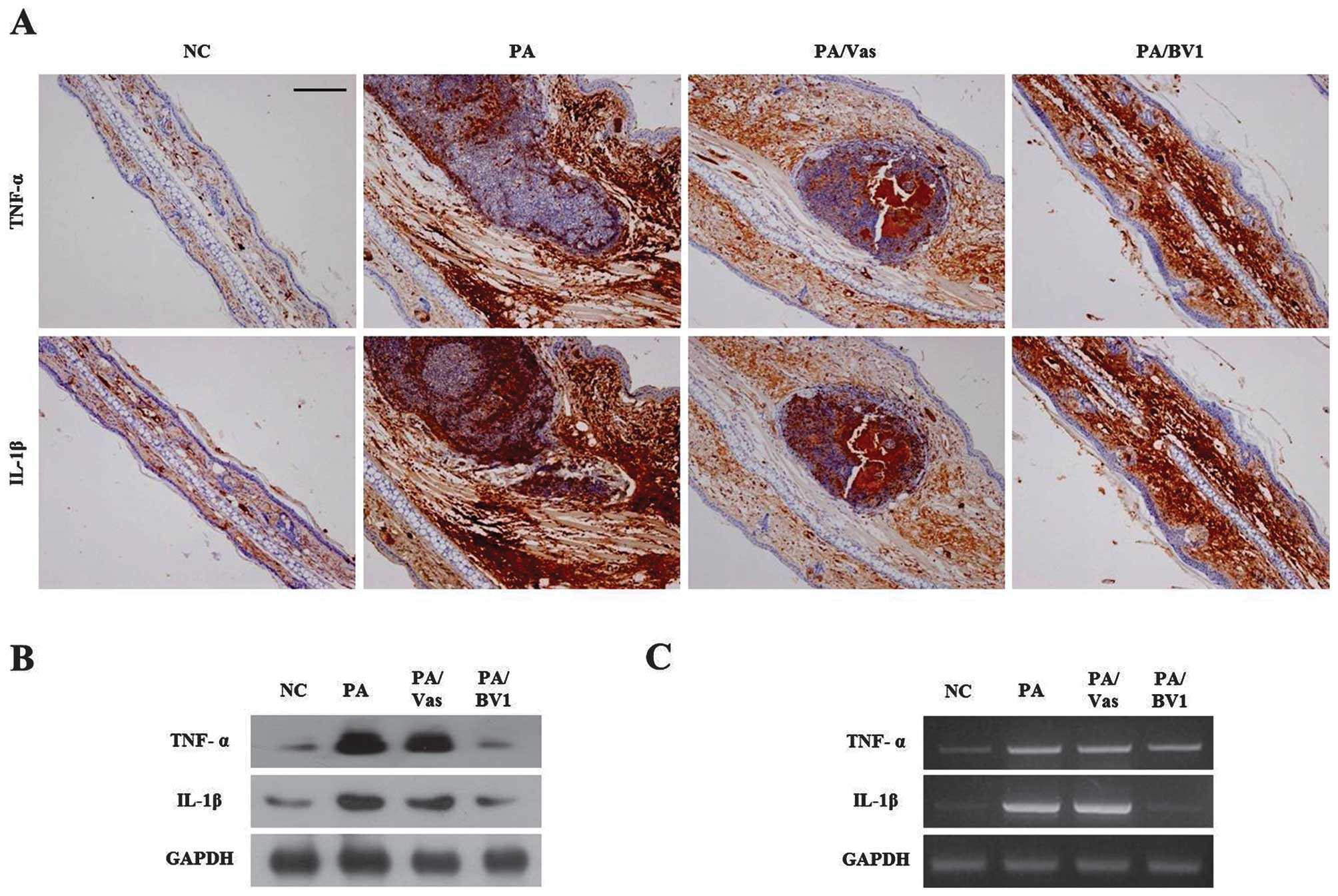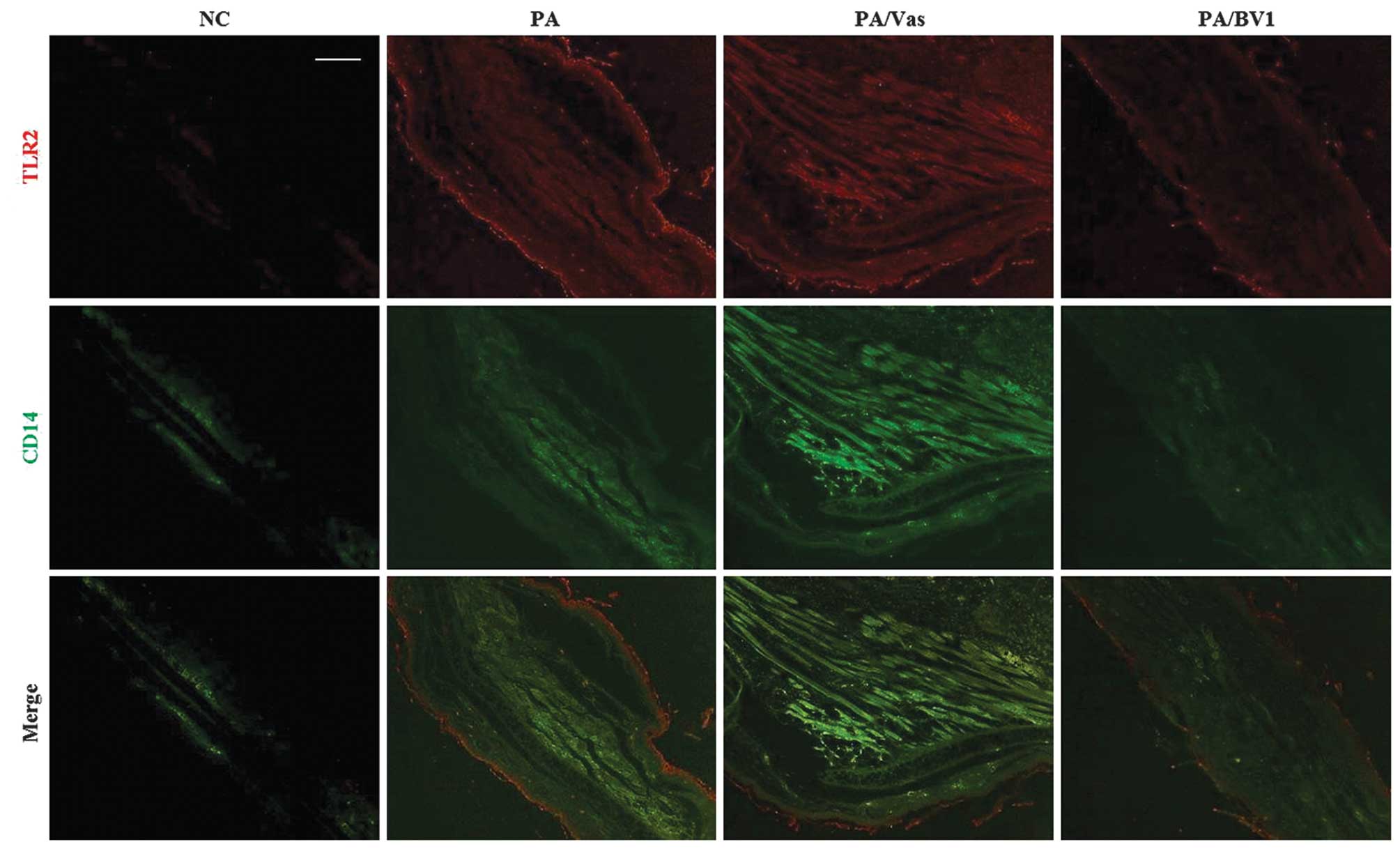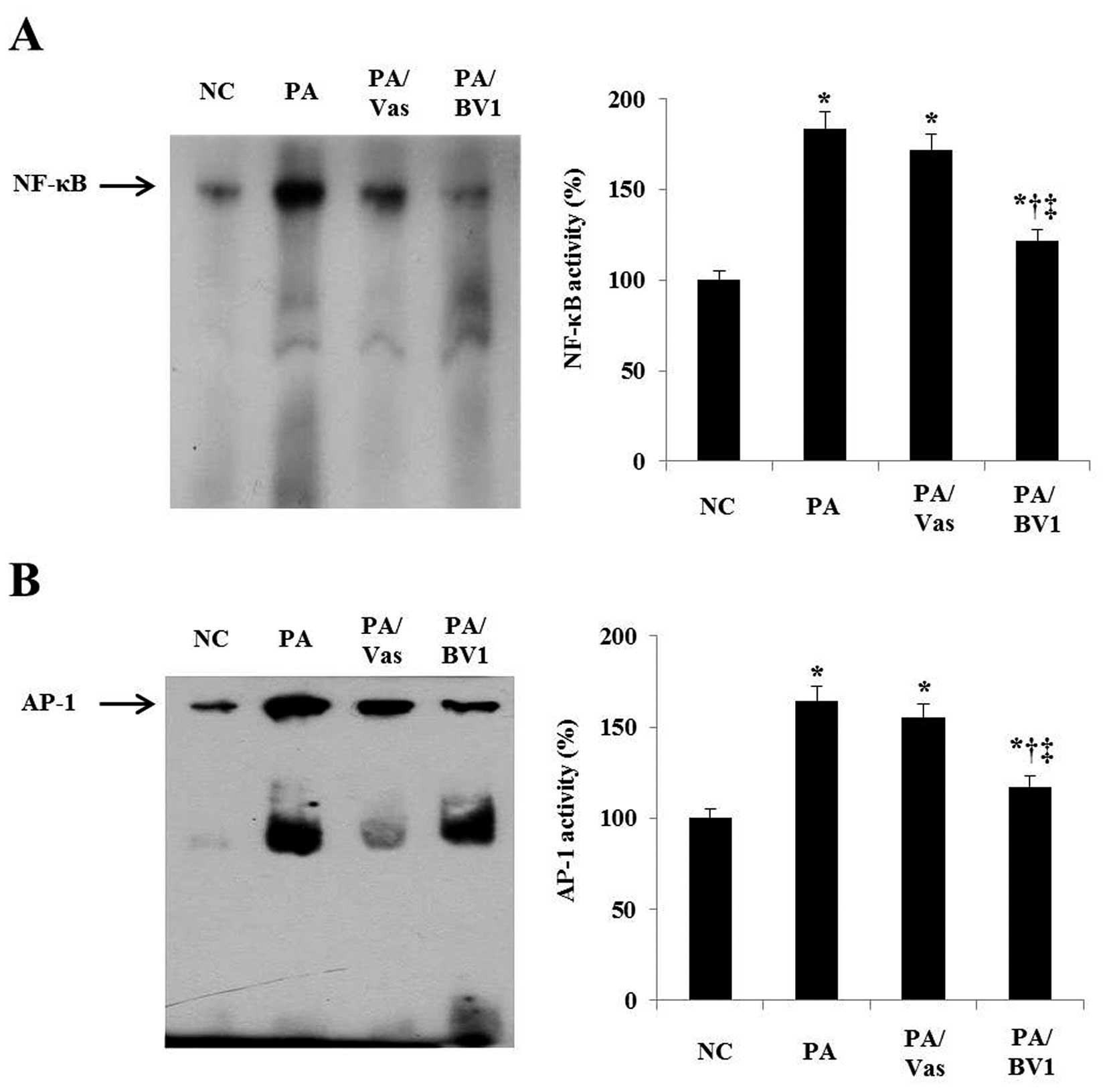|
1
|
Tsai HH, Lee WR, Wang PH, Cheng KT, Chen
YC and Shen SC: Propionibacterium acnes-induced iNOS and
COX-2 protein expression via ROS-dependent NF-κB and AP-1
activation in macrophages. J Dermatol Sci. 69:122–131. 2013.
View Article : Google Scholar
|
|
2
|
Jung MK, Ha S, Son JA, et al:
Polyphenon-60 displays a therapeutic effect on acne by suppression
of TLR2 and IL-8 expression via down-regulating the ERK1/2 pathway.
Arch Dermatol Res. 304:655–663. 2012. View Article : Google Scholar : PubMed/NCBI
|
|
3
|
Mak TN, Fischer N, Laube B, et al:
Propionibacterium acnes host cell tropism contributes to
vimentin-mediated invasion and induction of inflammation. Cell
Microbiol. 14:1720–1733. 2012. View Article : Google Scholar
|
|
4
|
Nakatsuji T, Kao MC, Fang JY, et al:
Antimicrobial property of lauric acid against Propionibacterium
acnes: its therapeutic potential for inflammatory acne
vulgaris. J Invest Dermatol. 129:2480–2488. 2009. View Article : Google Scholar : PubMed/NCBI
|
|
5
|
Pawin H, Beylot C, Chivot M, et al:
Physiopathology of acne vulgaris: recent data, new understanding of
the treatments. Eur J Dermatol. 14:4–12. 2004.PubMed/NCBI
|
|
6
|
Vowels BR, Yang S and Leyden JJ: Induction
of proinflammatory cytokines by a soluble factor of
Propionibacterium acnes: implications for chronic
inflammatory acne. Infect Immun. 63:3158–3165. 1995.PubMed/NCBI
|
|
7
|
Kim J: Review of the innate immune
response in acne vulgaris: activation of Toll-like receptor 2 in
acne triggers inflammatory cytokine responses. Dermatology.
211:193–198. 2005. View Article : Google Scholar : PubMed/NCBI
|
|
8
|
Medzhitov R, Preston-Hurlburt P and
Janeway CA Jr: A human homologue of the Drosophila Toll protein
signals activation of adaptive immunity. Nature. 388:394–397. 1997.
View Article : Google Scholar : PubMed/NCBI
|
|
9
|
Jugeau S, Tenaud I, Knol AC, et al:
Induction of toll-like receptors by Propionibacterium acnes.
Br J Dermatol. 153:1105–1113. 2005. View Article : Google Scholar : PubMed/NCBI
|
|
10
|
Kim J, Ochoa MT, Krutzik SR, et al:
Activation of toll-like receptor 2 in acne triggers inflammatory
cytokine responses. J Immunol. 169:1535–1541. 2002. View Article : Google Scholar : PubMed/NCBI
|
|
11
|
Williams HC, Dellavalle RP and Garner S:
Acne vulgaris. Lancet. 379:361–372. 2012. View Article : Google Scholar : PubMed/NCBI
|
|
12
|
Titus S and Hodge J: Diagnosis and
treatment of acne. Am Fam Physician. 86:734–740. 2012.
|
|
13
|
Feldman S, Careccia RE, Barham KL and
Hancox J: Diagnosis and treatment of acne. Am Fam Physician.
69:2123–2130. 2004.
|
|
14
|
Labro MT: Immunomodulation by
antibacterial agents. Is it clinically relevant? Drugs. 45:319–328.
1993. View Article : Google Scholar : PubMed/NCBI
|
|
15
|
Ayangco L and Sheridan PJ:
Minocycline-induced staining of torus palatinus and alveolar bone.
J Periodontol. 74:669–671. 2003. View Article : Google Scholar : PubMed/NCBI
|
|
16
|
Ramakrishna J, Johnson AR and Banner BF:
Long-term minocycline use for acne in healthy adolescents can cause
severe autoimmune hepatitis. J Clin Gastroenterol. 43:787–790.
2009. View Article : Google Scholar : PubMed/NCBI
|
|
17
|
Billingham ME, Morley J, Hanson JM,
Shipolini RA and Vernon CA: Letter: An anti-inflammatory peptide
from bee venom. Nature. 245:163–164. 1973. View Article : Google Scholar : PubMed/NCBI
|
|
18
|
Son DJ, Lee JW, Lee YH, Song HS, Lee CK
and Hong JT: Therapeutic application of anti-arthritis,
pain-releasing, and anti-cancer effects of bee venom and its
constituent compounds. Pharmacol Ther. 115:246–270. 2007.
View Article : Google Scholar : PubMed/NCBI
|
|
19
|
Kwon YB, Lee JD, Lee HJ, et al: Bee venom
injection into an acupuncture point reduces arthritis associated
edema and nociceptive responses. Pain. 90:271–280. 2001. View Article : Google Scholar : PubMed/NCBI
|
|
20
|
Pérez-Payá E, Houghten RA and Blondelle
SE: The role of amphipathicity in the folding, self-association and
biological activity of multiple subunit small proteins. J Biol
Chem. 270:1048–1056. 1995.PubMed/NCBI
|
|
21
|
Park HJ, Lee SH, Son DJ, et al:
Antiarthritic effect of bee venom: inhibition of inflammation
mediator generation by suppression of NF-kappaB through interaction
with the p50 subunit. Arthritis Rheum. 50:3504–3515. 2004.
View Article : Google Scholar : PubMed/NCBI
|
|
22
|
Khalaf H, Jass J and Olsson PE:
Differential cytokine regulation by NF-kappaB and AP-1 in Jurkat
T-cells. BMC Immunol. 11:262010. View Article : Google Scholar : PubMed/NCBI
|
|
23
|
Dryden MS: Skin and soft tissue infection:
microbiology and epidemiology. Int J Antimicrob Agents. 34(Suppl
1): S2–S7. 2009. View Article : Google Scholar : PubMed/NCBI
|
|
24
|
Sohail MR, Gray AL, Baddour LM, Tleyjeh IM
and Virk A: Infective endocarditis due to Propionibacterium
species. Clin Microbiol Infect. 15:387–394. 2009. View Article : Google Scholar : PubMed/NCBI
|
|
25
|
Dessinioti C and Katsambas AD: The role of
Propionibacterium acnes in acne pathogenesis: facts and
controversies. Clin Dermatol. 28:2–7. 2010.
|
|
26
|
Grange PA, Raingeaud J, Calvez V and Dupin
N: Nicotinamide inhibits Propionibacterium acnes-induced
IL-8 production in keratinocytes through the NF-kappaB and MAPK
pathways. J Dermatol Sci. 56:106–112. 2009.PubMed/NCBI
|
|
27
|
Fivenson DP, Breneman DL, Rosen GB, Hersh
CS, Cardone S and Mutasim D: Nicotinamide and tetracycline therapy
of bullous pemphigoid. Arch Dermatol. 130:753–758. 1994. View Article : Google Scholar : PubMed/NCBI
|
|
28
|
Zemtsov A and Neldner KH: Successful
treatment of dermatitis herpetiformis with tetracycline and
nicotinamide in a patient unable to tolerate dapsone. J Am Acad
Dermatol. 28:505–506. 1993. View Article : Google Scholar : PubMed/NCBI
|
|
29
|
Handfield-Jones S, Jones S and Peachey R:
High dose nicotinamide in the treatment of necrobiosis lipoidica.
Br J Dermatol. 118:693–696. 1988. View Article : Google Scholar : PubMed/NCBI
|
|
30
|
Lee WR, Park JH, Kim KH, Park YY, Han SM
and Park KK: Protective effects of melittin on transforming growth
factor-beta1 injury to hepatocytes via anti-apoptotic mechanism.
Toxicol Appl Pharmacol. 256:209–215. 2011. View Article : Google Scholar : PubMed/NCBI
|
|
31
|
Lee WR, Kim SJ, Park JH, et al: Bee venom
reduces atherosclerotic lesion formation via anti-inflammatory
mechanism. Am J Chin Med. 38:1077–1092. 2010. View Article : Google Scholar : PubMed/NCBI
|
|
32
|
Han SM, Lee KG, Yeo JH, Baek HJ and Park
KK: Antibacterial and anti-inflammatory effects of honeybee
(Apis mellifera) venom against acne-inducing bacteria. J Med
Plants Res. 4:459–464. 2010.
|
|
33
|
Lyte P, Sur R, Nigam A and Southall MD:
Heat-killed Propionibacterium acnes is capable of inducing
inflammatory responses in skin. Exp Dermatol. 18:1070–1072.
2009.
|
|
34
|
Mandell L, Moran AP, Cocchiarella A, et
al: Intact gram-negative Helicobacter pylori,
Helicobacter felis, and Helicobacter hepaticus
bacteria activate innate immunity via toll-like receptor 2 but not
toll-like receptor 4. Infect Immun. 72:6446–6454. 2004.PubMed/NCBI
|
|
35
|
Köllisch G, Kalali BN, Voelcker V, et al:
Various members of the Toll-like receptor family contribute to the
innate immune response of human epidermal keratinocytes.
Immunology. 114:531–541. 2005.PubMed/NCBI
|
|
36
|
Kurokawa I, Danby FW, Ju Q, et al: New
developments in our understanding of acne pathogenesis and
treatment. Exp Dermatol. 18:821–832. 2009. View Article : Google Scholar : PubMed/NCBI
|
|
37
|
Scharf S, Hippenstiel S, Flieger A,
Suttorp N and N’Guessan PD: Induction of human β-defensin-2 in
pulmonary epithelial cells by Legionella pneumophila:
involvement of TLR2 and TLR5, p38 MAPK, JNK, NF-kappaB, and AP-1.
Am J Physiol Lung Cell Mol Physiol. 298:L687–L695. 2010.
|
|
38
|
Kang S, Cho S, Chung JH, Hammerberg C,
Fisher GJ and Voorhees JJ: Inflammation and extracellular matrix
degradation mediated by activated transcription factors nuclear
factor-kappaB and activator protein-1 in inflammatory acne lesions
in vivo. Am J Pathol. 166:1691–1699. 2005. View Article : Google Scholar
|


















